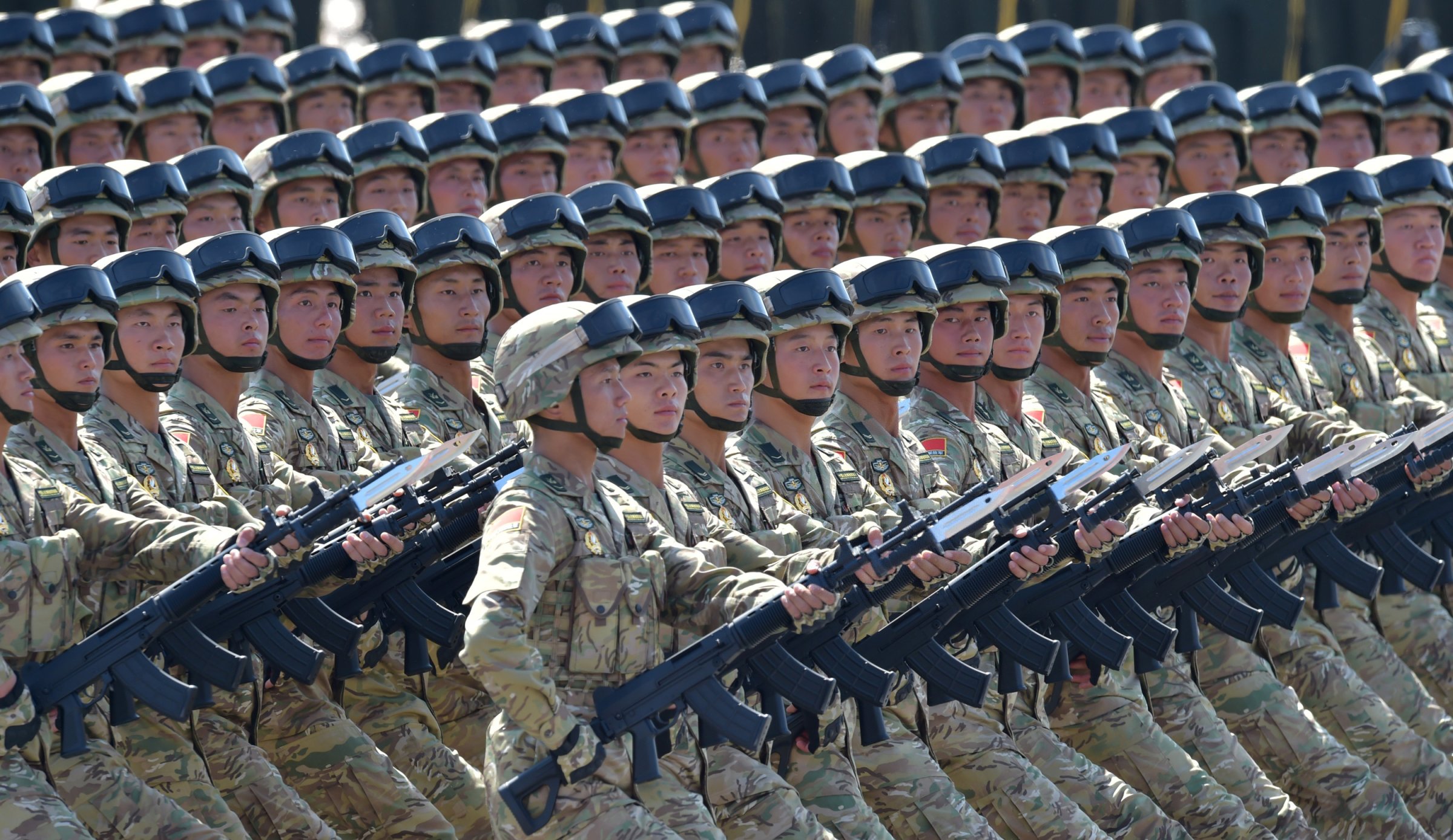
There is little about the fragrant sizzle of oysters, or sheets of kelp drying by agave-fringed shores, that hints at a Cold War frontier. But on Xiaodeng, a rocky island off China’s bustling southern port city of Xiamen, seafood and subterfuge go hand in hand. Measuring less than a square mile, it is the closest inhabited part of the People’s Republic to Taiwan, whose island of Kinmen looms through the fog. Over the decades, the periodic exchange of rockets between the two foes has forced people on both sides to retreat into deep defensive tunnels hewn from the solid rock. During times of peace, a propaganda battle has often taken over.
“Taiwan used to send biscuits and even old watches over by balloon,” says a Xiaodeng resident surnamed Hong, 76, beneath an awning in her courtyard. “But we were told they were poisoned and so never touched them.”
China and Taiwan split after Mao Zedong’s Communists forced the routed Nationalists across the Strait in 1949 at the end of China’s civil war, setting off decades of bristling rancor between the Soviet-backed victor and its American-propped foil. Beijing still considers Taiwan a renegade province to be reunited by force if necessary.
China’s State Council designated Xiaodeng and two neighboring islands — Da Deng and Jiao Yu — a “Hero’s Triangle” in 1958, owing to their front-line positions. Less than two miles separate Xiaodeng from Kinmen. That’s considerably less than the 90 miles from Cuba to Key West, and even narrower than the 2.5-mile Korean DMZ. The peoples of Taiwan and Fujian province, to which Xiaodeng belongs, may have been politically estranged for over half a century, but they share a culture, a cuisine and the Hokkien group of dialects.
In recent years, the political gap has slightly narrowed. In 1992, Beijing signed a consensus with the Kuomintang government then governing Taiwan, stating that there was “one China.” Even if the two sides disagreed over what its sovereign power should be, the consensus that there was an indivisible China was enough to send hourly ferries, packed with selfie-snapping tourists, between Kinmen and Xiamen — the island port city of which Xiaodeng is administratively a part. The consensus also prompted the launch of direct flights between various Chinese cities and Taipei.
But those warming relations have been directly challenged by new U.S. President Donald Trump. In stump speeches through the American heartland, he accused China, with its export-driven economy, of stealing American jobs. He vowed to label Beijing a currency manipulator and to impose 45% tariffs on Chinese imports. But, even worse from Beijing’s point of view, he accepted, while President-elect, a phone call from Taiwan’s President Tsai Ing-wen. A U.S. leader had not had direct contact with his Taiwanese counterpart since Washington recognized the People’s Republic in 1979. In talking to Tsai, Trump broke with four decades of diplomatic protocol and challenged what Beijing deemed its “core interests.”
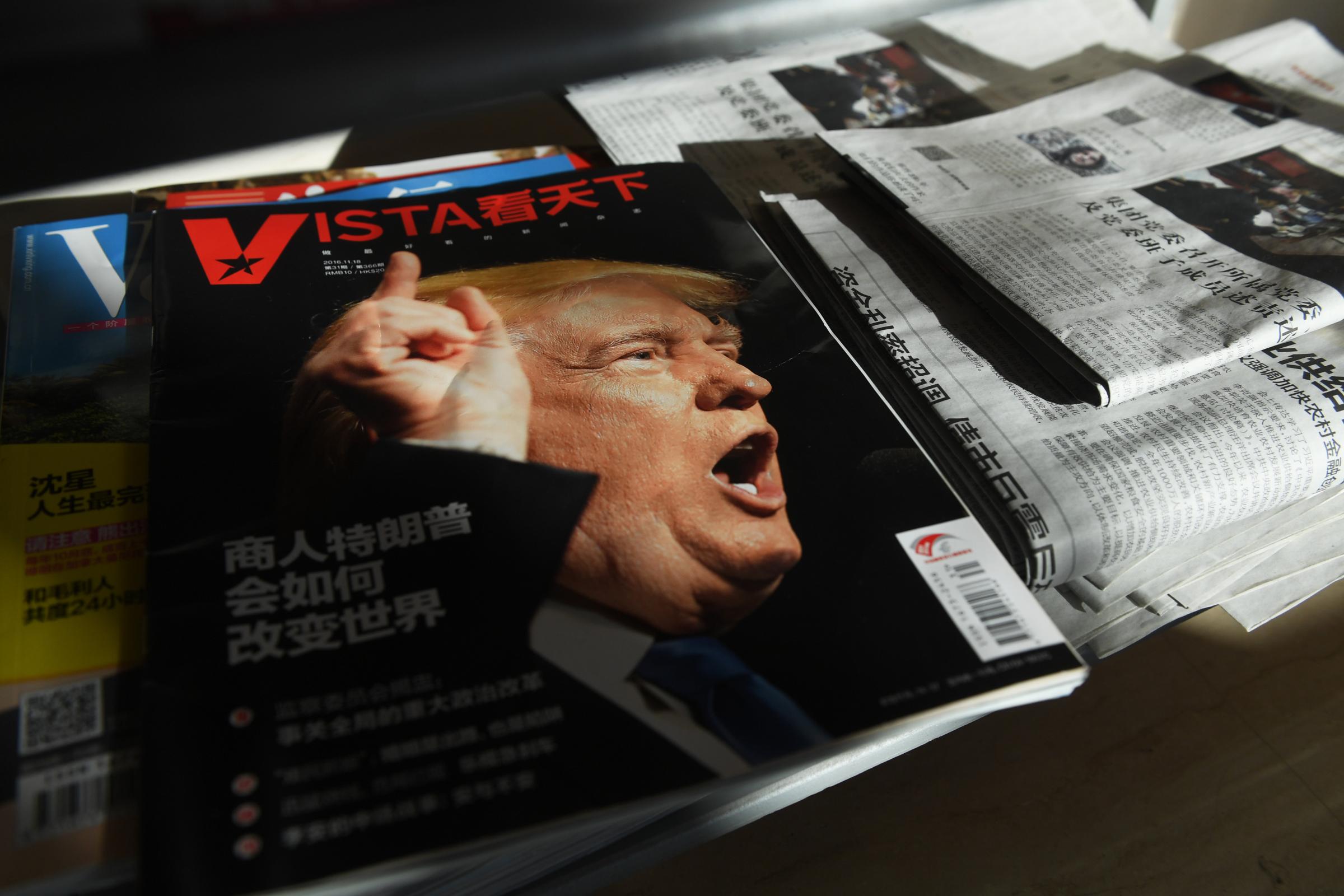
Things have since escalated. The U.S. position on China and Taiwan has long been a diplomatically nuanced acknowledgement of Beijing’s belief that there is “one China,” while holding that Washington will retain robust unofficial relations with Taiwan, to which it sells arms and to which it has pledged military assistance, should it ever come under attack from Beijing. Trump, however, has repeatedly insisted that U.S. recognition of “one China” was up for negotiation, treating it and Washington’s obligations to the Taiwanese as bargaining chips to be used to extract more favorable trade terms from Beijing.
Even more worryingly, Rex Tillerson, Trump’s nominee for Secretary of State, told a Senate committee that China should be barred from the seven artificial islands it has built in the South China Sea, over most of which Beijing claims sovereignty, competing with neighbors Vietnam, the Philippines, Taiwan, Malaysia and Brunei, who also claim parts of the sea. The artificial islands, built up through reclamation to bolster Beijing’s maritime claims, are mini Chinese fortresses — hosting antiaircraft guns and other sophisticated weaponry, according to recent analysis.
In a press briefing Monday, Trump’s press secretary Sean Spicer repeated Tillerson’s challenge. “It’s a question of if those islands are in fact in international waters and not part of China proper, then, yeah, we’re going to make sure that we defend international territories from being taken over by one country,” Spicer said.
China’s state media have responded forcefully to the suggestion, warning that any such attempt would force a “devastating confrontation” and that both sides should “prepare for a military clash.” In the meantime, tensions are likely to escalate. Although it would benefit nobody, says Zhu Feng, professor of international relations at Nanjing University, “We cannot exclude the possibility of a new cold war.”
‘The world is opening up, but Trump is trying to close the U.S.’
A return to those dark days would not be welcome in Xiamen, a city that symbolizes the great leaps China has made over the past four decades, as well as its lofty ambitions for the future. Even before it was ceded as a British treaty port in 1842, the city formerly known as Amoy had always buzzed with trade. Its majestic Bund is stacked with Regency-style shop houses, invoking Penang or Singapore, and similarly punctuated with the occasional ruby-red Taoist temple. From here, merchants shipped tea, lacquer, rice and spices to all over the world. And when Chinese leader Deng Xiaoping launched his “reform and opening” in 1978, Xiamen was once again at the vanguard. It was one of China’s original quintet of Special Economic Zones that opened to foreign trade in 1980, spearheading the nation’s transformation into the world’s second largest economy today.
Xiamen, like China, is changing once again. The nation that was once the butt of cruel made-in-China jokes is reinventing itself. Today, behind Xiamen’s pearl-white colonial terraces are glistening skyscrapers of steel and glass, where Chinese corporations extend their reach across every continent. A country that once kept its currency devalued to maintain the competitiveness of its exports is now keeping it high to stem huge capital outflows. The factories pumping out plastic toys and cheap novelties — “rubber dogsh-t,” to quote the immortal line from 1980s movie Top Gun — are now producing the next generation of technology.
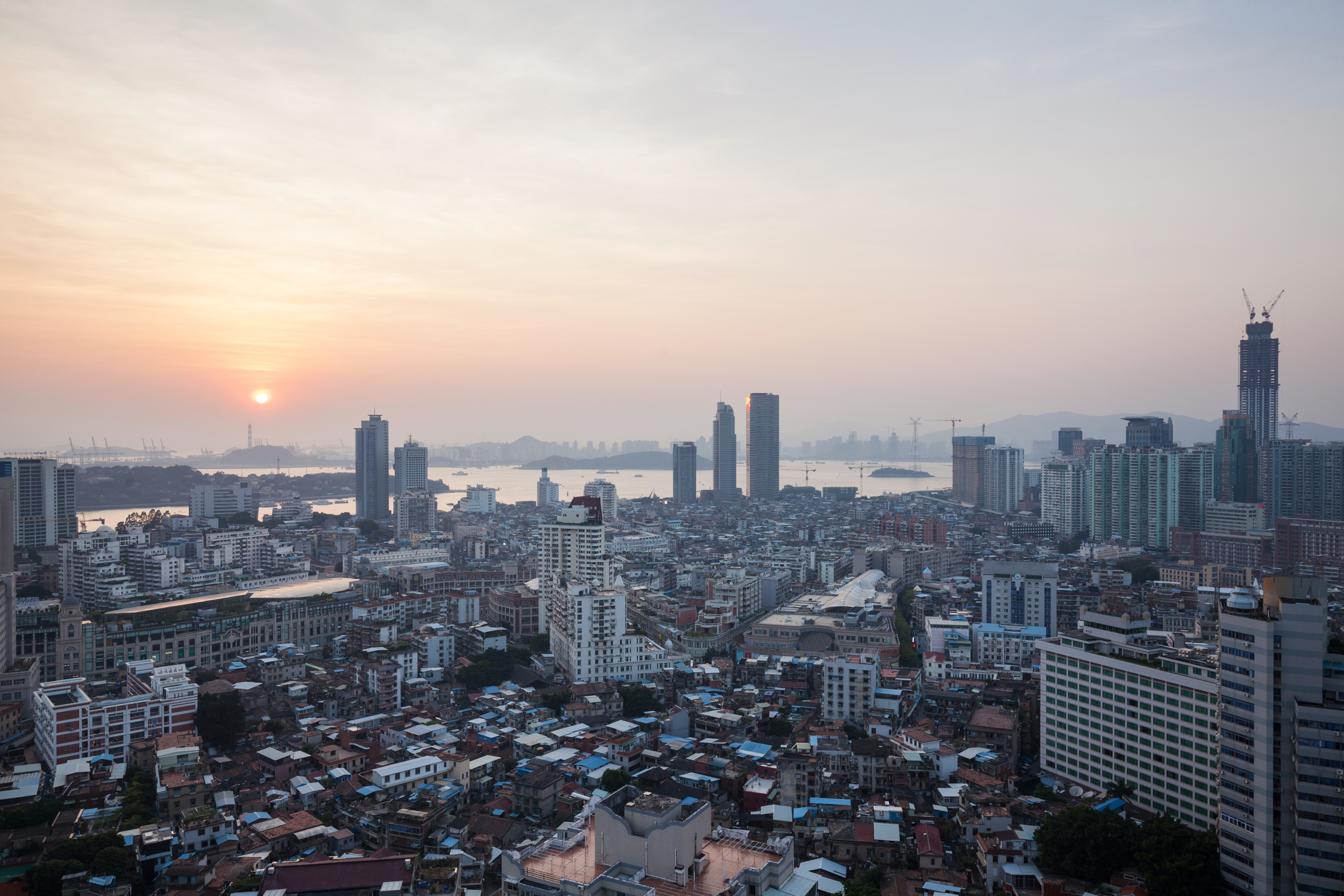
Xiamen company Newyea represents this paradigm shift. Founded by 2013, and valued at $145 million, the firm pioneers the latest in contactless charging devices. It has over 100 patents and produces components for cell-phone makers like Samsung, Blackberry and LG. It is also currently talking with U.S. aerospace giant Boeing about installing contactless chargers on its aircraft, an innovation that would boost aviation safety by eliminating the considerable fire hazard of live wires and sockets around every seat.
“‘Made in China’ has new meaning today, and the world is opening up, but Trump is trying to close the U.S.,” says Newyea co-founder Xu Ayi over tea in his firm’s office. “Trump’s a bad apple and even Americans need to worry about him.”
Taiwan is not just the only “core interest” attacked by Trump; foreign trade is as much part of modern Chinese DNA today as “one China.” And no one has embraced that transformation more wholeheartedly than its President, Xi Jinping. It is, in fact, part of his family legacy. Xi’s father Xi Zhongxun was purged and imprisoned by the Communist Party under Mao, though was later “rehabilitated” and became a key supporter of Deng’s capitalist experiments. He took various leadership roles in the southern province of Guangdong, and was instrumental in transforming it into China’s most affluent region. When Xi the younger was finally allowed to join the party, he followed in his father’s footsteps, with one of his first official roles as vice mayor of Xiamen.
Xi was not a local. The singsong Hokkien tongue and muggy sea air were utterly alien for a northerner like him. Yet he quickly made an impression with his dedication to ensuring that Xiamen was a business-friendly environment. Xi served three years in Xiamen — where he also met and married his second and current wife, renowned singer Peng Liyuan — out of 16 years in Fujian province, during which he helped lure an influx of South Korean, Japanese and Taiwanese manufacturers. These are policy priorities that remain central to Xiamen’s identity. Newyea, for one, has received government grants of almost $1.5 million over the past three years.
“Electronics and software are the two pillar industries in Xiamen,” says chairman Lin Guijiang. “Local government has greatly subsidized these industries and that makes Xiamen a magnet for talent.”
These are also the liberal economic values that Xi has taken onto the international stage. When he became the first Chinese leader to address the World Economic Forum in the Swiss Alpine resort of Davos, Xi issued a stern defense of globalization and rebuke of Trump’s protectionism — as unlikely as that was, coming from a nominally communist leader.
“We must remain committed to developing global free trade and investment, promote trade and investment liberalization and facilitation through opening up and say no to protectionism,” he said. “No one will emerge as a winner in a trade war.”
To be sure, there are still many barriers to such a development. Apple makes one-fifth of its sales and Boeing earns 13% of revenue in China. There are also structural impediments; the WTO was set up primarily to consign trade wars to the history books. However, many argue that the WTO has long failed in its regulatory function, and that China’s accession has not turned it into a great consumer for manufacturers looking to sell to the world’s most populous nation. Despite a raft of WTO measures, and China’s budding affluence, China’s imports have slid steadily relative to its GDP since it signed up in 2001.
China’s own brand of protectionism has contributed to the swell of support for Trump, who has repeatedly accused Beijing of being a currency manipulator and employing predatory trade practices. Trump says that the U.S.-China trade deficit — $367 billion in 2015 — costs America jobs. Economists generally disagree — “It’s not true historically and it’s not true logically,” says Derek Scissors, chief economist of data-analytics firm China Beige Book International — though it’s undeniable that China’s record on free trade is actually pretty poor. Large sections of the Chinese economy are closed off to foreign investors, its huge state-owned enterprises enjoy massive subsidies, and theft of intellectual property is rife. The landscape for foreign investment is worsening too, with draconian national-security rules, like a new cybersecurity law, throwing up onerous hurdles for foreign firms. And at the same time, China demands — and largely gets — unfettered access into the markets of other countries.
“I don’t think they are a very good economic partner,” Scissors says of China.
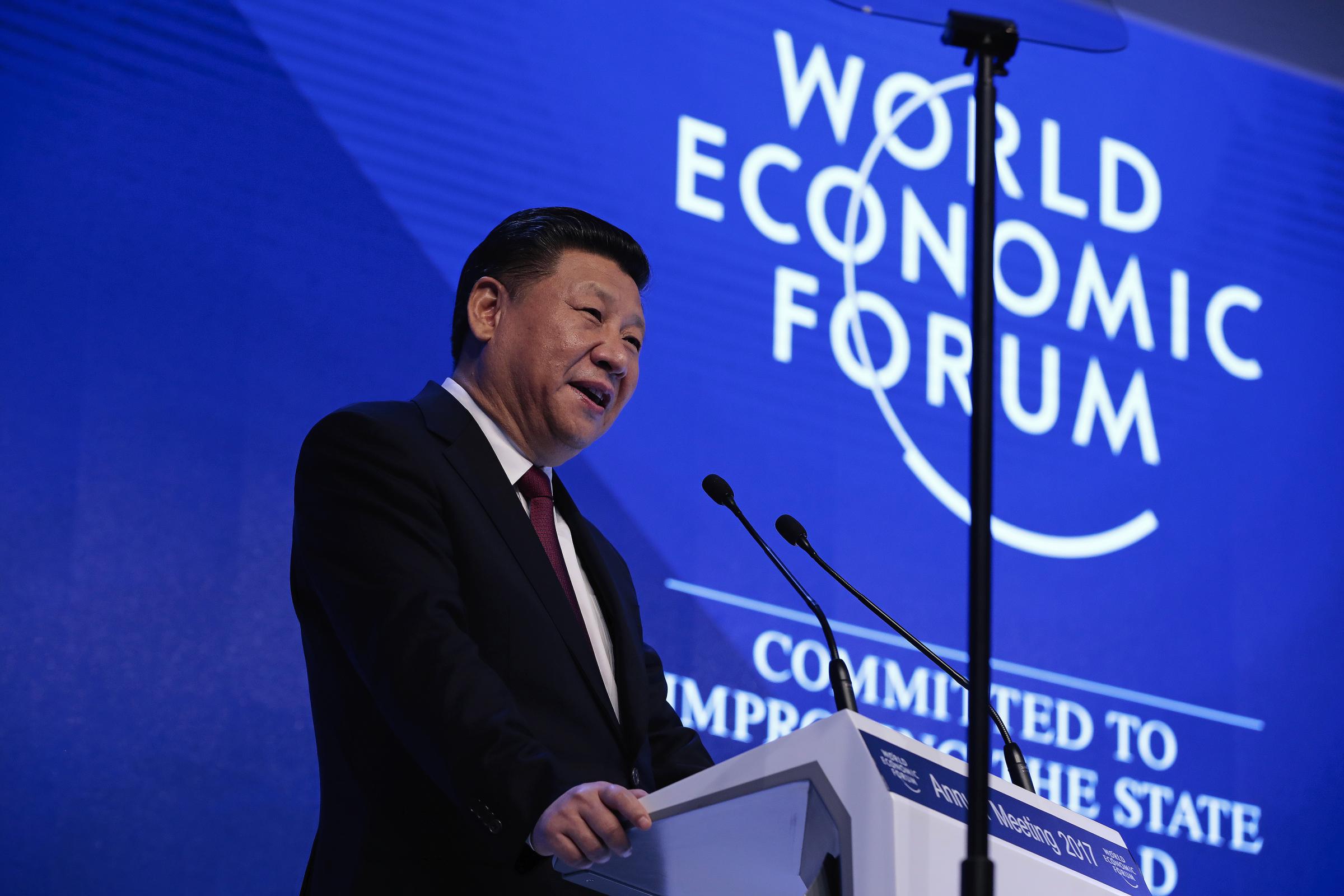
Xi spoke glowingly at Davos about how Chinese plans to have domestic consumption replace exports were taking shape; however, the numbers tell a very different story. China will continue to rely on exports for its fiscal health for the foreseeable future. Economists expect, if realized, Trump’s threat of 45% import tariffs would cut 1% to 3% off Chinese GDP, which is already at a postreform low of 6.7% (if you believe the official figures). But even if that doesn’t happen, the GOP also has a proposal for a 35% blanket “border adjustment” tax on all imports. China might not be singled out, but as its largest trading partner, it will be the worst affected.
To make matters worse, Beijing is already having economic problems. Exports shrank 6.1% to $209.4 billion in December compared with the same month the year before, according to customs data posted last week — the eighth consecutive monthly fall. Trade in general is suffering, with combined imports and exports contracting 6.8% last year. But more pressing for China are its balance of payment woes. China’s foreign-currency reserves shrank by $350 billion in 2016. A lot of money is leaving the country, as wealthy Chinese find loopholes around every new regulation and hurdle. Although China can weather considerable gross capital outflow because it has by far the world’s biggest trade surplus, once that trade surplus is eaten into then real dangers crop up. China’s holdings of U.S. Treasury securities plunged by a whopping $66.4 billion in November, following $41 billion the month before — marking six consecutive monthly falls. Standing at $1.049 trillion, China’s holdings are now only second largest behind Japan.
‘If domestic matters prove difficult, a foreign crisis could be helpful’
All this spells bad news for workers like Wu Man. The 29-year-old moved to Xiamen from China’s industrial northern province of Hubei, and spends 10 hours a day, six days week testing and packing light bulbs at a factory in northern Xiamen. The unrelenting routine of twist, untwist, wrap in plastic, earns her $580 a month, a quarter of which she sends home to her grandparents, who care for her two children, ages 1 and 7.
“My husband and I are still young, so we decided to stay here and make more money,” she says above the din of industrial machinery. “This company has better welfare than most, and a shuttle bus goes to where I live.”
Under China’s autocratic system, workers like Wu do not vote, but her livelihood is inexorably tied to the political legitimacy claimed by the Chinese Communist Party (CCP). The party today is the largest wealth-creation organ the world has ever known, having hauled 600 million people out of abject poverty and spawned the world’s highest numbers of billionaires. But its authority will always be under threat unless it can deliver continuing growth and opportunities for all 1.3 billion Chinese. It isn’t coincidental that China is experiencing an ideological tightening at the same time as its economy is slowing, with independent civil society decimated, critical academics and journalists gagged, and even lawyers persecuted and imprisoned.
Trump’s rise is interesting timing for Xi. More than half of the Politburo Standing Committee — the nation’s apex political body — are due to be replaced at the 19th five-yearly National Congress of the CCP in 2017. The next generation of leaders will be anointed and the party’s ideological direction redefined. The stakes are high. Xi is China’s strongest leader for generations — he was named a “core leader” on a level with Mao in October — and he needs to project in fallibility.
As CCP leader, Xi has made enemies by going after the military, the domestic security services, domestic intelligence services, his nation’s sacrosanct state enterprises, and corrupt officials across all strata of the party. “There are a lot of sharp knives and a lot of people who would like to plunge them into Mr. Xi’s back,” says Scott W. Harold, a China specialist for Washington think tank Rand Corp. The CCP also has a virulent leftist caucus, which abhors the wanton wealth inequality of recent years as a betrayal of socialist values. (To burnish his, Xi reportedly held a “democratic life session” recently for Politburo members to read out Cultural Revolution–style self-criticisms and to profess loyalty.)
In this light, a trade war with the U.S. could be a black mark for Xi. But more likely, Harold says, “if domestic matters prove difficult, a foreign crisis could be helpful.”
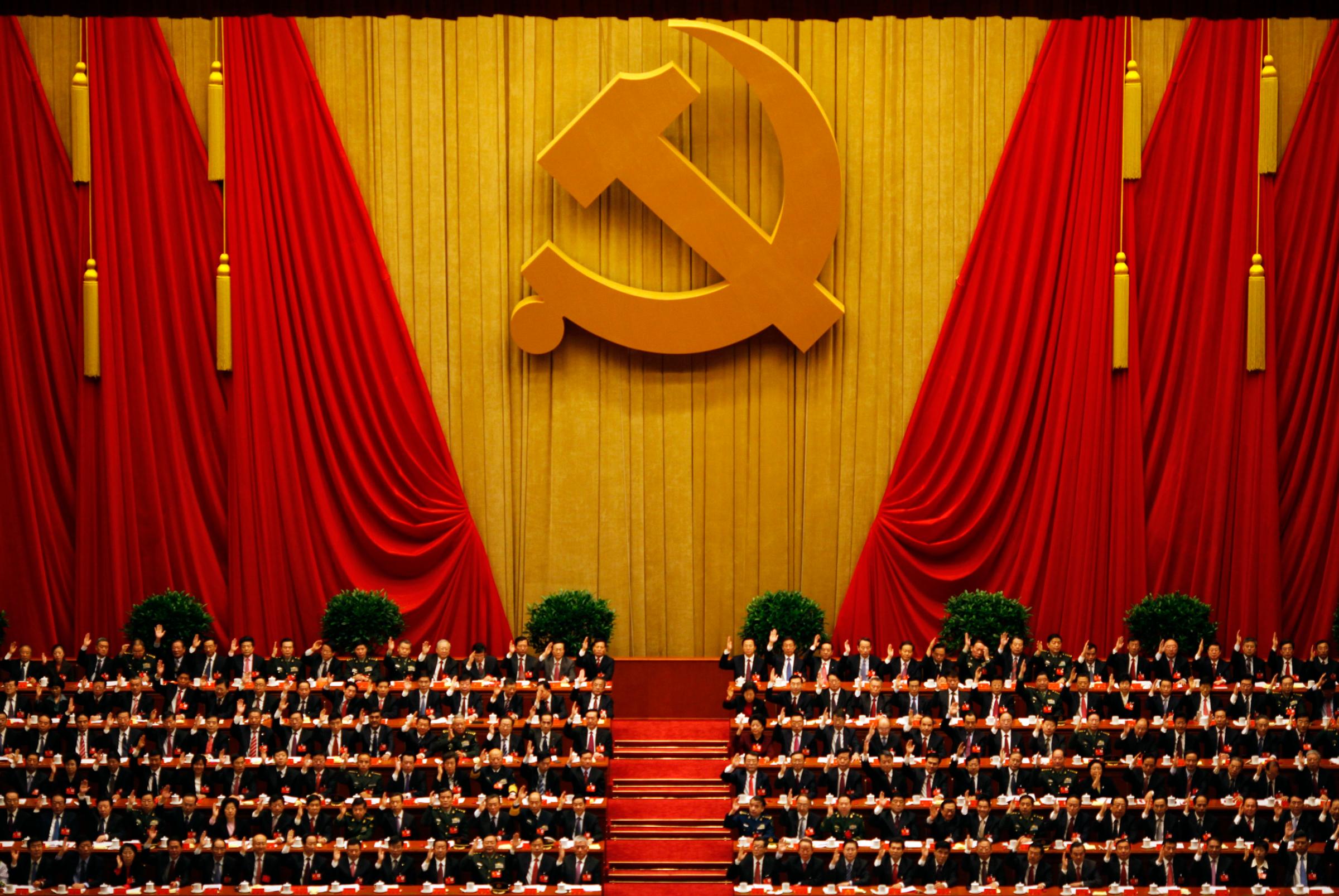
Saber rattling and CCP Congresses go hand in hand. In the lead-up to the 18th Congress in 2012, that most sensitive time when Xi was finally named CCP general secretary and confirmed to take over the presidency, China was positively bellicose, seizing the Scarborough Shoal in the South China Sea and stoking protests against Japan’s purchase of the disputed Diaoyu Islands (known in Japan as the Senkaku). In 2017, attempts by the U.S. to get tough on trade, Taiwan or the South China Sea could feed the narrative that meddlesome foreigners are once again giving downtrodden China a hard time, and also provide Xi with political capital to push forward military reform and modernization. Trump’s bombast gives no shortage of opportunities.
“It’s a risky interaction between Trump’s style and Chinese sensitivity,” says Scissors.
Of course, Sino-U.S. relations were far from rosy under Obama, with the world’s established superpower and its aspirant one clashing over human rights, IP theft, cyber espionage, the South China Sea, how to rein in North Korea, and the deployment of the U.S. THAAD antimissile system in South Korea. When Obama attempted to forge the Trans-Pacific Partnership free-trade pact, which Trump nixed on Monday in a move that will only increase China’s influence, Beijing was one of the few nations to opt out. When Beijing launched the Asian Infrastructure Bank, Washington openly campaigned against allies joining, including Australia and the U.K., despite it being in their clear interests to do so.
Historically, the rapprochement between Washington and Beijing sparked by Nixon’s fabled 1972 visit was never rooted in amity for the Chinese socialist project, but mutual enmity with the Soviet Union. In an attempt to sideline Moscow, Washington was willing to engage with China in the hope that it would reform, open up and democratize. But the latter never happened, and on democracy and human rights these two blocs remain at ideological loggerheads. “For many in the Trump camp, I don’t think they believe the Cold War with China ever ended,” says Harold. “They think that America just hasn’t been fighting.”
That looks set to change under Trump, who has even been quoted saying, “let there be an arms race” between the nuclear powers. However, China is in the ascendant militarily. The Philippines, traditionally America’s staunchest ally, has become antagonistic with Washington and close to China since President Rodrigo Duterte took office last year. There are resurgent calls to remove U.S. troops from bases in South Korea and Japan, who both list China as their largest trading partners. Recent analysis sponsored by the Naval War College suggests the Chinese navy will have more than 430 major warships and almost 100 submarines by 2030, dramatically outclassing the U.S. Navy in size and capability. Trump has pledged to expand the navy to 350 ships — a prospect experts say will cost half a trillion dollars — while paradoxically campaigning on drawing down commitments on costly wars overseas.
That withdrawal will encourage China to pick up the torch of global leadership. It will also open the door for America’s old arms-race competitor, Russia, to assert itself even further in international affairs. “We are going back to a world where you can’t consider the U.S.-China relationship without also considering Russia,” says Professor Rana Mitter, a China specialist at Oxford University.
The emboldened Russian leader Vladimir Putin is already proving instrumental in reshaping the Middle East, where the U.S. is understandably chastened after its experiences in Iraq and Afghanistan. Talks at ending the war in Syria continued between Russia, Iran and Turkey in Kazakhstan this week, with the U.S. conspicuously absent. And having seized Crimea with few repercussions, other than economic sanctions it shrugged aside and that Trump could soon lift, Putin has been making his neighbors extremely nervous. Last July, the Latvian President requested that then U.S. Vice President Joe Biden give a televised speech to assure Baltic states that the U.S. would defend them against a Russian invasion.
Every sign is that the new U.S. Administration will be willing to give Putin plenty of latitude. Trump repeatedly praised Putin during his presidential campaign, and Tillerson, the former CEO of ExxonMobil, has a long history of deals with the Kremlin — even being awarded the Russian Order of Friendship in 2013. Trump’s repeated avowal to “put America first” does not indicate his Administration will be a reliable backer.
And that brings us back to Taiwan. President Tsai should be very cautious, says Mitter, as “in the short term, [putting America first] might involve provoking China and then using Taiwan as some sort of leverage.” Scott agrees: “Taiwan is clearly the weakest and most vulnerable player in this three-person act.”
That is not a new situation for Taiwan, of course, and the plucky islanders have long thrived on adversity. There is a reason why Kinmen, 140 miles from Taiwan proper, remains ruled by Taipei despite being surrounded on three sides by the People’s Republic. Simply, it serves to keep the fight alive.
At the same time, the front line is morphing rapidly. Xiaodeng is an island no longer. At its western edge, a gargantuan land-reclamation operation is linking Xiaodeng with the mainland beyond. Teams of migrant workers in floral bonnets shovel mountains of sand that will soon become Xiamen’s new international airport. The smooth, level banks of two runways have already taken shape, with the first stage of construction due for completion in 2020. Covering a total area of 9 sq. mi., the new complex is designed to eventually handle 75 million annual passengers — rivaling even that of Capital Airport in Beijing. But the project has devastated Xiaodeng’s fishing and seaweed industries.
“Islanders aren’t happy about the airport,” says Qiu Meihui, a tour guide who comes from three generations of islanders. “But there is no one we can complain to, nothing we can do.” Not even the Hero’s Triangle can stand in the way of China’s growth. America can expect no clemency if its new President tries to do the same.
— With reporting by Zhang Chi / Xiamen
More Must-Reads From TIME
- The 100 Most Influential People of 2024
- Coco Gauff Is Playing for Herself Now
- Scenes From Pro-Palestinian Encampments Across U.S. Universities
- 6 Compliments That Land Every Time
- If You're Dating Right Now , You're Brave: Column
- The AI That Could Heal a Divided Internet
- Fallout Is a Brilliant Model for the Future of Video Game Adaptations
- Want Weekly Recs on What to Watch, Read, and More? Sign Up for Worth Your Time
Write to Charlie Campbell / Xiamen at charlie.campbell@time.com